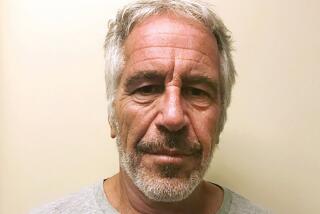Seeing both sides of the Episcopal divide
At St. James Anglican Church in Newport Beach, the Rev. Richard Crocker told parishioners Sunday to await the “good news of a God who’s with us,” an upbeat message despite a recent legal ruling that could strip the congregation of its property because of its break with the Episcopal Church.
At St. John’s Cathedral near downtown Los Angeles, whose congregation has remained within the Episcopal fold, the Very Rev. Canon Mark R. Kowalewski told parishioners that the Episcopal Church is “one church, one family.”
The two messages came just days after the California Supreme Court ruled that congregations choosing to leave the Episcopal Church may lose church buildings and property because they belong to the national church.
The ruling culminated a lawsuit filed by the Episcopal Diocese of Los Angeles and the national church against St. James and two other congregations in Long Beach and North Hollywood after they broke away partly over objections to the 2003 consecration of a gay priest as bishop of New Hampshire.
On Sunday, pastors -- and their parishioners -- voiced divergent opinions about the ruling and a broader conflict over gays in the Episcopal Church that has provoked legal battles across the country and led breakaway parishes and dioceses last month to announce the formation of a separate Anglican Church in North America.
Crocker referred to the court’s ruling only briefly in his Sunday sermon, calling it “very bad news.”
But he said he remained optimistic that further legal action would result in a favorable outcome for the congregation, although he did not offer specifics. St. James is now affiliated with the Anglican Church of Uganda.
“We don’t know what the future holds, but we do know who holds the future,” Crocker said, eliciting a hearty “Amen!” from the pews. “God’s good news is never quite how we expect it.”
Crocker added that the congregation would consider its options but that reconciliation was unlikely.
“Our disagreements [with the Episcopal Church] are profound,” he said in an interview. Parishioners at St. James, he said, are “convinced of the appropriateness of the decision [to leave] and will see it through.”
Bill Dunlap, 60, a senior warden at St. James, said he wished his congregation had “won outright” in court, but “we’re not in charge. God is. God will show us the direction.”
Dunlap has attended St. James since 1956. Faced with the prospect of losing the church and its property, he said his concern is about “spreading the word of God, not about bricks and mortar.”
Forty miles to the north, near the end of Sunday’s service at St. John’s, Kowalewski sounded a different theme: He said the Episcopal Church was “not a collective of individual operators.”
Kowalewski read a letter from the Rt. Rev. J. Jon Bruno, the bishop of the Los Angeles diocese, saying, “The Episcopal Church continues its long tradition of welcoming among its members a diversity of opinion, including loyal dissent. Our church remains a large tent expansive enough to include many views and voices while united in common prayer.”
After the service at St. John’s, just blocks from USC, congregants said they were hopeful the disaffiliated parishes would return to the church.
“I think you can have diverse opinions,” said Karen Uhler, 68.
Uhler, the senior warden at St. John’s, said she began going to the church in 1992 because of its progressive values. She remembered when the congregation symbolically closed its doors to protest the Gulf War.
“That’s why I drive from Venice,” Uhler said.
Another parishioner, Dan Justin, 36, said he recently finished seminary and is in the process of becoming a priest. But his path to the pulpit has not been easy. Years ago, he said, he was thrown out of religious training at a nondenominational church in St. Louis because he was gay.
On Sunday, Justin said he was glad the courts ruled in favor of the diocese. “Those churches were established years ago,” and those buildings are property of the Episcopalian Church, he said.
Justin said that he thought those who left the church “truly believe in the core of their being that they’re honoring God,” but that he didn’t agree with many of their views about limiting the role of homosexuals in church life.
Since last week’s court ruling, Bruno has reached out to the breakaway churches, hoping for reconciliation. In an interview Sunday, he said he hoped the court’s unanimous decision would encourage parishioners from the three churches to return.
“We really would love to have these people find a home back in the Episcopal Church,” he said.
Bruno said he has struggled personally with the departure of the congregations and the subsequent legal fight over their property.
“It’s painful for me to lose friends in these congregations,” he said. “They are still my friends, I pray, but they cannot worship with me because they choose not to.”
Crocker, the rector of St. James parish, said it was a tragedy that his congregation and the Episcopal Church are in “disagreement about central beliefs.” But he insisted that, whatever the outcome of the legal battle with the Episcopal Church, St. James will remain intact.
“The church is the people,” Crocker said. “We often mistake ourselves by calling church buildings the church. But ultimately, the congregation is together.”
--
Times staff writer Duke Helfand contributed to this report.
ari.bloomekatz@latimes.com
More to Read
Start your day right
Sign up for Essential California for news, features and recommendations from the L.A. Times and beyond in your inbox six days a week.
You may occasionally receive promotional content from the Los Angeles Times.






